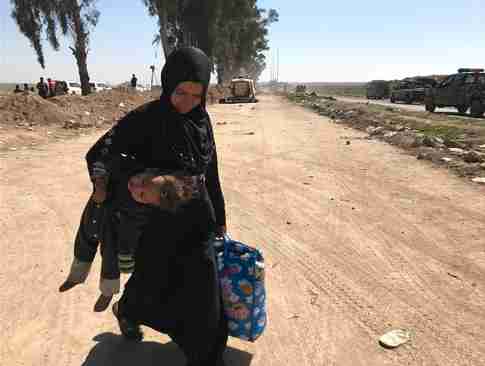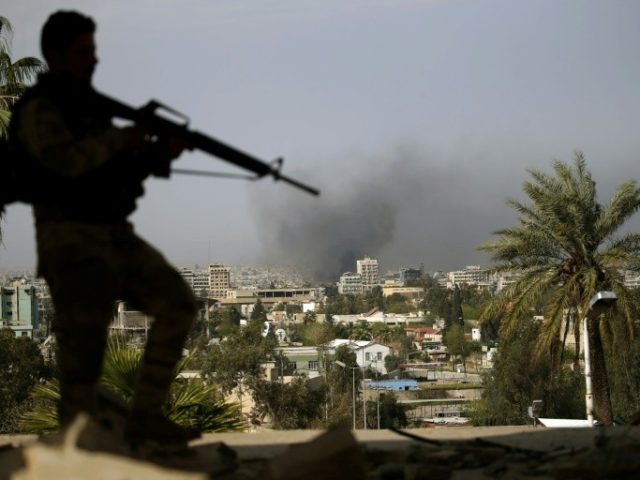This morning’s key headlines from GenerationalDynamics.com
- UN says lengthy Mosul operation leading to major humanitarian disaster
- ISIS using both mustard gas and chlorine gas attacks in Mosul
- Iraq says that ISIS and al-Qaeda are in talks to join forces
UN says lengthy Mosul operation leading to major humanitarian disaster

Woman fleeing Mosul carries her child in one hand and a bag of belongings in the other (CNN)
It has now been six months since October 17, 2016, the beginning of the military operation to recapture Iraq’s second largest city, Mosul, from the so-called Islamic State (IS or ISIS or ISIL or Daesh). Iraq’s army is leading the offensive, with support from the United States with a mix of Special Operations Forces, intelligence and close air support.
But frustrations are growing because progress has been slow. The portion of Mosul on the east side of the Tigris river has already been recaptured, but the dense population, the narrow streets of western Mosul, and the advance preparation of the ISIS fighters combine to slow the operation down to a crawl.
ISIS has booby-trapped streets and buildings with IED bombs, and attacks with suicide motorbike attacks, and sniper and mortar fire. If ISIS fighters are using a particular building as a base or for storage of weapons, local residents are forced to live in the building as human shields, so that it cannot be bombed by American warplanes.
According to the United Nations, the scale of civilians fleeing Mosul is “staggering,” and relief efforts have been stretched to the “operational limits.” According to a Lise Grande, the UN’s Humanitarian Coordinator for Iraq:
“Our worst case scenario when the fighting started was that up to one million civilians may flee Mosul. Already, more than 493,000 people have left, leaving almost everything behind,” Lise Grande, the Humanitarian Coordinator for Iraq, said in a news release issued by the UN Office for Coordination of Humanitarian Affairs (OCHA).
“The sheer volume of civilians still fleeing Mosul city is staggering… We are doing everything we can but this has been a long battle and the assault on the old city hasn’t started.”
The UN claims that since fighting began in October, they have provided some 1.9 million people with food, water, shelter, emergency kits, medical support and psycho-social services.
The UN emphasizes that all parties to the conflict are obliged, under International Humanitarian Law, to do everything possible to protect civilians, ensure they have the assistance they need and limit damage to civilian infrastructure. Haha. United Nations and Reuters and Al Jazeera
Related Articles
- Iraq begins battle to recapture Mosul from ISIS (17-Oct-2016)
- Iraq halts Mosul operation after US coalition airstrikes kill hundreds of civilians (26-Mar-2017)
- Concerns grow over chaos in Iraq after ISIS is defeated in Mosul (22-Mar-2017)
ISIS using both mustard gas and chlorine gas attacks in Mosul
On Friday of last week, ISIS fired a rocket loaded with chlorine at a neighborhood in western Mosul, injuring seven soldiers, according to Iraqi military sources.
On Sunday, 25 Iraqi soldiers in a unit with US and Australian advisers suffered breathing problems after being hit by a mustard gas attack.
Gas masks are being distributed to Iraqi forces, in case of future gas attacks. AP and CBS News
Iraq says that ISIS and al-Qaeda are in talks to join forces
According to Iraq’s vice president Ayad Allawi, ISIS and al-Qaeda are talking about forming an alliance, once ISIS is defeated in Mosul:
The discussion has started now. There are discussions and dialogue between messengers representing Baghdadi and representing Zawahiri.
Allawi was referring to ISIS leader Abu Bakr al-Baghdadi and al-Qaeda head Ayman al-Zawahiri.
Although an alliance between ISIS and al-Qaeda might seem like a jihadist’s dream come true, the two organizations are like oil and water.
The al-Qaeda-linked organization in the region is Jabhat al-Nusra (al-Nusra Front) which renamed itself Jabhat Fateh al-Sham (JFS) when it cut its ties to al-Qaeda. It did so in order to join forces with Ahrar al-Sham, a “moderate” anti-Assad group that did not want to have any links to jihadist organizations, either al-Qaeda or ISIS. Nominally, JFS is no longer linked to al-Qaeda, although some analysts believe that the links still exist.
ISIS was formed from about 50,000 jihadist fighters from 86 countries that came to Syria to fight al-Assad. These foreigners were not welcomed by the Syrian fighters, either the “moderate” fighters or the al-Nusra Front fighters, and so al-Nusra and ISIS began fighting each other.
For years, al-Assad and ISIS have been effectively allied. That’s because ISIS was interested in gaining territory, and that was at the expense of the militias of Syrian citizens. So al-Assad and ISIS both were targeting the Syrian opposition to the government.
Now that ISIS is close to defeat in Mosul, Iraq, and is being attacked by a military operation in its stronghold Raqqa, in Syria, it’s not surprising that the two thuggish organizations are talking to each other. In today’s bizarro world where it seems that anything can happen, maybe they can find a way to form some kind of working relationship. But what’s far more likely is that when ISIS is defeated it will split up, and its members will return to their home countries and, in some cases, perform terrorist acts there. Reuters and Newsweek and Fox News
Related Articles
KEYS: Generational Dynamics, Iraq, Mosul, Islamic State / of Iraq and Syria/Sham/the Levant, IS, ISIS, ISIL, Daesh, Jabhat Fateh al-Sham, JFS, Front for the Conquest of Syria, Lise Grande, United Nations, al-Qaeda, Syria, Bashar al-Assad, Ayad Allawi, Abu Bakr al-Baghdadi, Ayman al-Zawahiri, Ahrar al-Sham
Permanent web link to this article
Receive daily World View columns by e-mail

COMMENTS
Please let us know if you're having issues with commenting.